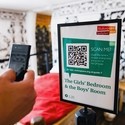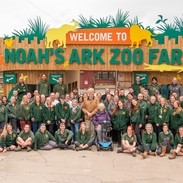Other digital marketing channels
Photo by: VisitBritain/Sam Allard/Shakespeare Birthplace Trust

TripAdvisor and online review sites
What are they?
TripAdvisor is one of the best-known providers of reviews in travel and tourism. Others include well-known sites such as Google, Facebook, Yelp and OpenTable. All of them allow public feedback on hotels, restaurants, attractions and tourism businesses.
Why are they important?
Online reviews are often the where tourists look first – a global TripAdvisor and Ipsos MORI study in 2019 showed 72% of travellers used online reviews for decisions on where to visit, eat and stay. Guests are also able to book through sites like TripAdvisor.
How do I get on TripAdvisor?
The first step is to claim your business listing. You can do this in steps:
Search for your business in the business owners’ section. If it appears in the search results, then select on ‘Claim Your Business’;
Verify yourself as the owner;
You can now update your profile by adding photos, opening times, prices and other essential details;
Once registered, you’re ready to respond to customers’ reviews;
If you want, you can select TripAdvisor’s paid advertising options, known as Sponsored Placements, which push your business to the top of the listings. These work in a similar way to Google Ads, with set budgets and opportunities to put in special offers.
Other considerations
Getting online reviews – both good and bad – is part of digital marketing. When responding, it’s important to remain calm and measured – anything you say online can be swiftly shared and easily taken out of context.
Online reviews checklist:
Search for ‘[your business name] reviews’ across search engines.
Take note of the frequency, comments and ratings on all platforms.
Claim your listing on TripAdvisor through their Owner page. This is free to do.
Fill out all details of your listing, paying close attention to images – particularly your main listing picture.
Positive reviews can help your search engine ranking. Encourage satisfied customers to leave reviews, by adding a button on your website or social media feed.
It is important to acknowledge reviews. Engaging with customers is more likely to have a positive outcome and encourage a return.
Be careful when writing your response to bad reviews, as tone can be difficult to convey online.
If you receive a negative review, consider the following format when responding: Acknowledge, Defuse, Detail, Resolve. It’s often best to acknowledge publicly and offer to continue the conversation privately.
Use reviews to identify any customer service issues and, if appropriate, rectify the problem.
Online reviews resources
TripAdvisor insights
Learn the top traveller trends from TripAdvisor’s business insights.
TripAdvisor for business: the complete guide
Read ReviewTrackers’ guide on how to get the most out of TripAdvisor.
TripAdvisor tips for Sponsored Placements
See TripAdvisor’s advice on making the most of your Sponsored Placements and Instant Booking, if you decide to use them.
Lucy Green, Exmoor Character Cottages, Somerset
“Our digital marketing budget now accounts for more than 60% of our marketing spend. My advice is to be realistic: Start small and measure, measure, measure. If something doesn’t work, stop it and try something else. It’s better to concentrate on attracting a smaller number of the right people, genuinely interested in your business, than try to attract thousands of followers. Digital marketing isn’t about instant results, so don’t expect lots of bookings to happen straight away from one advert – customer relationships need nurturing to engender trust: that isn’t any different online.”
Online Travel Agents (OTAs) and Travel Metasearch Engines
What are they?
Online Travel Agents (OTAs) aggregate availability and pricing for thousands of hotels into one platform. The most common examples are the hotel booking websites Booking.com, Hotels.com, Expedia and TripAdvisor. Metasearch engines are websites like Kayak, Trivago and SkyScanner, which aggregate search results from many other sites.
How do they work?
OTAs take payment for the booking and collect customer details, then pass these on to the accommodation provider and charge a commission. With metasearch sites, typically, a user selects a product, then clicks through to a booking site (usually an OTA) to complete their purchase. The metasearch site then charges a commission for the referral. Metasearch sites include Kayak, Trivago and SkyScanner.
Airbnb and Vrbo:
Airbnb has become one of the most powerful platforms in the online accommodation space. It is mainly geared towards holiday properties, apartments and bed and breakfasts, although increasingly some hotels are using the platform for bookings too. Heading towards 7 million listings, featuring more than 4 million hosts and a presence in more than 220 countries and regions throughout the world. Its main competitor is Vrbo. In general, hosts and guests pay commission on bookings. Like OTAs, the main advantage is the exposure it gives as the user base is enormous. Guests and hosts both have the opportunity to review each other after their stay.
OTA and travel metasearch checklist
Evaluate the costs and rewards: are the extra bookings worth the fees? OTA and metasearch bookings attract commission, so while they may generate extra revenue, you will also have to pay added fees.
Consider the impact of OTA pricing on your own bookings. OTA sites often offer deals, discounts and loyalty schemes that can be hard to match.
Check how your existing booking systems will connect with OTAs and metasearch providers. OTAs work best with an automatic feed, usually a channel manager. This connects to your property management system (PMS), which then controls the distribution across a variety of online channels.
Create (or claim) your listings and ensure all details are accurate and up-to-date.
Invest in good quality photography (and possibly video) to make your property stand out and spend
Respond to customer reviews and leave your own reviews where appropriate.
OTA and travel metasearch resources
Trivago Business Blog
Check out Trivago’s business blog, for useful advice and insights.
Metasearch engines and how they work
Cover the metasearch basics with Mews and read advice how to get started.
Analysis of major Online Travel Agencies
Stay up to date with Online Travel Agencies with Cloudbeds’ analysis.
Selling through Online Travel Agents
Read an introduction to OTAs and the pros and cons, from Nibusinessinfo.co.uk.NI Business.
Mat Arney, Cornish Rock Tors
“In our industry, there is a tendency to only have time to think about marketing in the off-season. Consistency is key. We’ve been operating for over 15 years and have been showing up consistently on our social channels, week in and week out, for over five years.”
“Our digital communications have a higher ratio of informative or entertaining content compared to straight sales messages. We share activity tips, facts about the ocean and the flora and fauna that live in it, relevant adventure stories and local history. This develops a relationship that leads to sales without pushing them, and when we do explicitly include a call to action to book with us, we feel we’ve earned the right to put that in front of people.”
Cornish Rock Tors, Cornwall. Credit: Mat Arney
Photo by: Mat Arney

Tourism Exchange GB (TXGB)
What is TXGB
TXGB was launched in partnership with VisitEngland to provide the UK tourism industry with a central marketplace. It’s free to join, and enables tourism businesses to trade, collaborate and innovate. TXGB makes it easy to be bookable online and share your products, live availability and prices with distributors. This all helps find new customers and drive sales.
To find out more about TXGB and how it can help your tourism business.
nav
Previous







